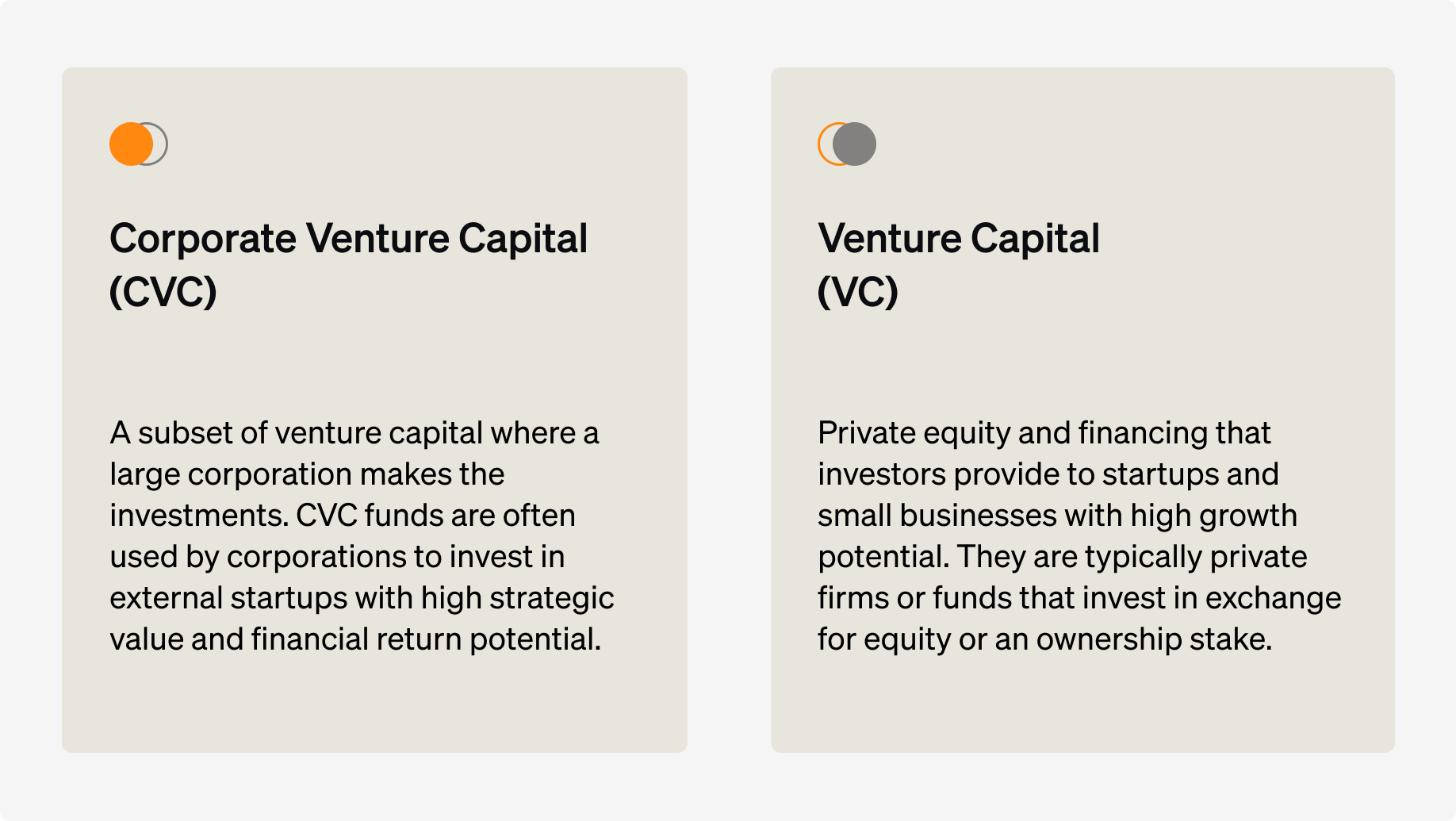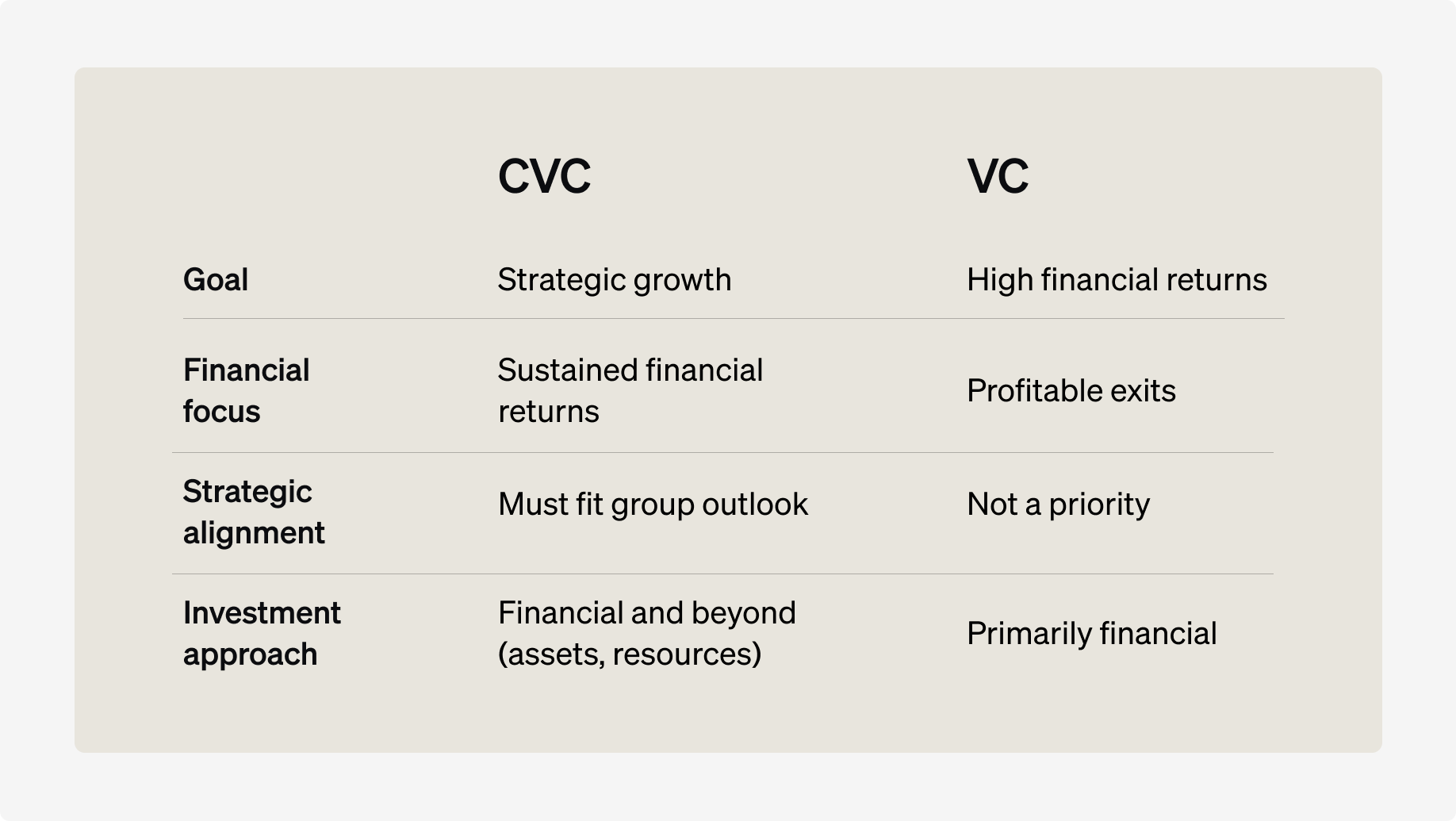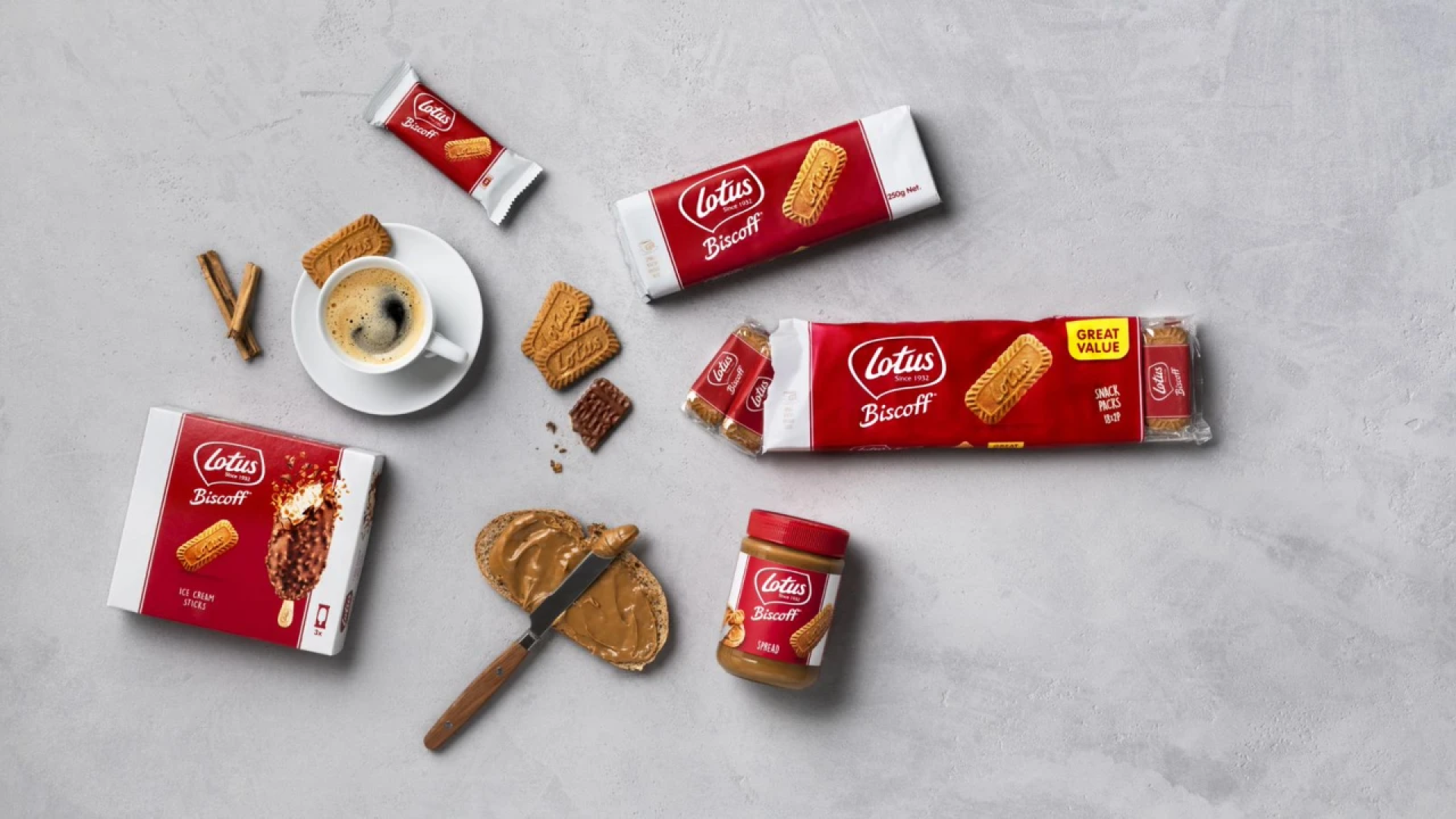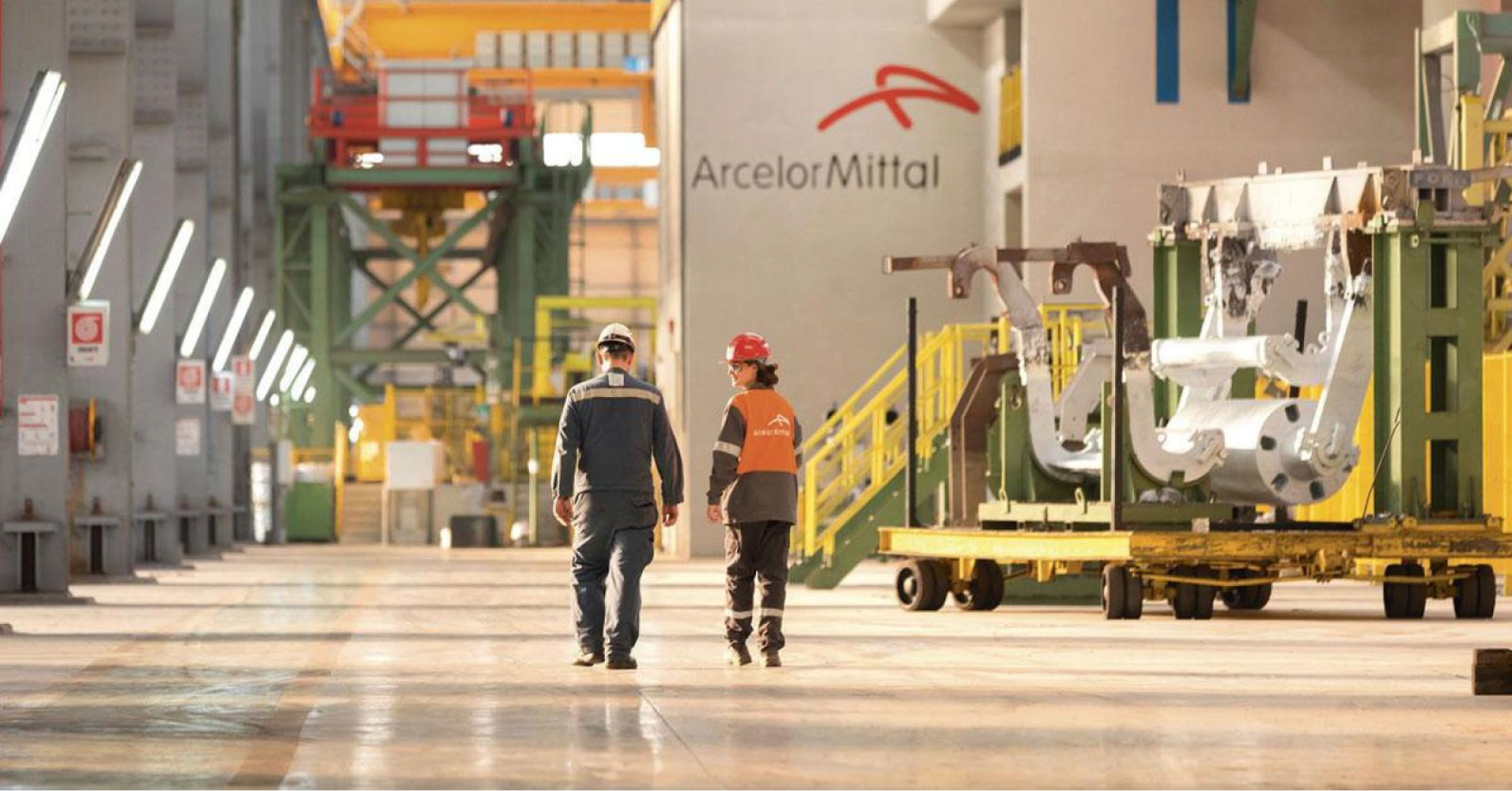Key takeaways
This article was created in collaboration between our Venture Architect Laia Camps, Venture Hub Lead Christian De Catelle, and Jeppe Høier - a seasoned CVC expert (Follow his newsletter on LinkedIn).
Corporate Venture Capital (CVC) has steadily become a tool to drive innovation and strategic growth. And, despite the drop in the overall venture capital market, companies worldwide are still setting up CVC funds as an alternative to traditional acquisitions—making minority investments, reducing risk and moving more securely towards potential M&A.
- Most of the top 100 US companies in the Fortune 500 have active CVC units.
- CVCs account for almost a quarter (and 45% of later-stage rounds) of all VC investing.
- 65 new CVC units were set up in 2023 (down from 122 in 2022).
- CVC deal value increased over tenfold during the past decade (though 2023 was 27% lower than 2022).
The potential for high returns with reduced risk certainly adds to the attractiveness of CVCs in today’s uncertain climate, but their popularity is most attributed to their speed in bridging the gap between corporates and startups.
Why? New ideas and technologies can change entire markets overnight, and startups are leading the way with new innovations at an unprecedented rate and scale.
CVCs enable corporations to support and tap into this rich startup ecosystem, diversifying their portfolios, reducing the risk of disruption and gaining access to ideas and technologies.
To give you a better idea of how CVCs work in practice, we’ve created this practical guide outlining how the model works, its operational setup and some real-world case studies showcasing how you can unlock new opportunities through strategic investments.
VC vs CVC: What’s the difference?
To start, let’s cover the definitions:

Both VCs and CVCs share a common goal of empowering startups, but they differ in their foundational objectives.
VCs chase high financial returns fueled by external investment and measured by profitable exits. In contrast, the underlying motivation of CVCs is more strategic, focusing on factors like:
- Alignment
- Integration potential
- Long-term synergy
- Enhanced market stance
- Fortifying core operations
In other words, CVCs blend financial returns and strategic goals, serving as a dual-purpose instrument for corporate innovation. However, it’s important to note while the underlying goal is strategic and to avoid disruption in the long term, financial returns are a top priority.

Setting up a strategic CVC: 4 Key considerations
1 - Foundational elements
The first step is to carefully select the right foundational elements: legal structure, source of capital, governance, team structure, compensation, and many others.
Start focusing on the following grounding elements:
Purpose & objective
The core of your CVC strategy should be in sync with your parent company's overarching innovation and growth goals. It’s about looking beyond just financial returns and nurturing growth areas that complement and enhance the core business.
Legal structure
Consider whether to integrate your CVC into the parent company's existing financial framework or set it up as an independent entity. The goal is to choose a structure that enables you to effectively balance strategic alignment and financial autonomy.
Autonomy and independence
The degree of independence will dictate your CVC's agility in decision-making and investment choices. Finding the right balance is critical because it helps maintain strategic alignment without stifling flexibility.
Governance and C-level integration
The success and lifespan of a CVC, which typically averages less than four years, heavily depend on its relationship with your company’s senior management. Having backing from executives like the CEO or CFO is essential for its survival. Governance models should involve multiple C-level participants to ensure a more integrated approach.
2 - Second layer elements
Once you have a solid view of the foundational elements, dive deeper by focusing on these second-layer elements:
Effective startup integration
It's crucial to develop a set of protocols that facilitate the smooth startup integration. The process should ensure that new ventures align well with the parent company's culture and operational goals.
Funding strategy and stage involvement
Defining the funding levels, sources, and at what stages your CVC will engage with startups (e.g. early, late, or a blend) is vital. This will help you make focused decisions later on.
Compensation and talent attraction
Consider introducing a shadow carry program—blending internal know-how and expertise with insights from external investments and an understanding of the broader ecosystem. The approach can be a magnet for top-notch professionals looking for a dynamic work environment.
3 - The strategy paper
A comprehensive strategy paper is a pivotal step towards the success of your CVC. The document should clearly outline the agreed-upon:
- Objectives
- Key performance indicators (KPIs)
- Metrics for success
The goal is to ensure seamless alignment between your CVC and overarching corporate goals. Signed by the board and C-level executives, this document serves as a blueprint for the CVC's long-term viability, addressing common pitfalls commonly faced by CVCs, e.g.:
- Financial non-performance in the 3-4 year mark
- Lack of strategic relevance in the 6-7 year mark
4 - The HR benefits that come with CVCs
Collaborations between HR and CVCs are a great way for corporates to boost their innovation culture. These collaborations enable employees to learn new skills reducing the need for external hires. Aside from improving general skills, these collaborations are also beneficial to the CVC because they facilitate integration with the mothership.
In addition, these types of collaborations help companies avoid the “not made here” mindset and make the most of their team’s skills.
Unlocking new markets: Three strategic CVC case studies
1 - Taking promising companies into the future: FF2032 by Lotus Bakeries

In 2019, Lotus Bakeries launched FF2032 (short for “Fast Forward 2032”), a corporate venture fund armed with €30M.
Focused on the broader food & drinks space, FF2032’s mission is to transform and reshape the food and drinks industry. Targeting areas like health, nutrition, and convenience, FF2032 set out to identify and nurture brands that resonate with their vision. To achieve these goals, they provide minority growth equity to help promising startups scale their operations.
For Lotus, the launch of FF2032 wasn’t just about financial returns, it’s a strategic move to explore the healthy food space, innovate and expand their market share - all while providing more varied and healthy options for their customers.
Strategy
Navigating the competitive and fast-paced world of startups, FF2032 had to balance strategic alignment with the agility required for venture capital success. Its investment philosophy focused on late-stage companies, combining financial prudence with strategic foresight.
Portfolio
FF2032’s investment portfolio includes companies like FitJoy, Aura Bora and IQBAR, among others.
A standout was the FF2032’s strategic partnership with Peter's Yard. Initially acquiring a 20% stake, FF2032 not only fuelled Peter's Yard's growth but also aligned it closely with Lotus Bakeries’ vision. This partnership culminated in Lotus Bakeries acquiring 100% in 2022, a move that significantly bolstered its natural foods portfolio and market position in the UK.
Corporate assets
FF2032's success lies in leveraging Lotus Bakeries' market presence and industry knowledge. By positioning itself as more than a financial backer, FF2032 offers its portfolio companies invaluable strategic and operational support, driving innovation that aligns with the parent company's larger market ambitions.
Takeaways
FF2032's journey illustrates the power of strategic CVCs in driving corporate innovation and market expansion. It underscores the importance of aligning investments with corporate vision, the agility required to capitalise on market opportunities, and the foresight needed to integrate startups into the larger corporate fabric.
2 - Sustainable innovation for a traditional pasta maker: BluFuture by Barilla

In 2017, Barilla launched BluFuture (previously Blu1877) with programs focused on acceleration, partnerships, investments, and more. With an undisclosed fund size, BluFuture demonstrates Barilla's commitment to fostering sustainable food solutions and transforming the food industry.
BluFuture’s mission is to be a catalyst for sustainable food solutions in the FoodTech and AgTech sectors. Its hybrid approach combines an investment fund with an Open Innovation Hub, offering innovators access to the company's pilot plant, cutting-edge technologies, a virtual expertise network, and resources for experimentation and development (e.g. advanced research laboratories and kitchens).
Strategy
Part of BluFuture’s mission is to integrate cutting-edge innovation within the traditional framework of a leading global pasta maker. They work with young startups that already have a prototype or product in the early stages of development, with focus areas that include:
- Bakery products
- Pasta
- Sauces and condiments
- Fruit-based products
- Sustainable diets
Portfolio
BluFuture’s portfolio includes companies like Renewal Mill, Plant Jammer, SmartCloudFarming and more.
A notable case was BluFuture’s investment in Pasta Evangelists in 2021. The UK-based fresh pasta delivery service became a part of the Barilla family through strategic seed investment (which supported Pasta Evangelists' exponential customer and revenue growth) and its later acquisition. This move allowed Barilla to strengthen its position in the UK's fresh pasta market, significantly enhancing its digital and e-commerce footprint.
Corporate assets
Here are just a few of the ways the different BlueFuture programs leverage Barilla’s corporate assets to drive innovation:
- Brand and reputation: BlueFuture capitalises on Barilla's strong brand presence to strengthen it’s startups credibility and consumer trust, an invaluable asset for emerging businesses.
- Expertise and network: Barilla offers a wealth of industry knowledge and a vast network of contacts, including suppliers, distributors, and retailers. This can help guide startups through market complexities and scaling their operations.
- R&D resources: Startups under BlueFuture have access to Barilla’s extensive R&D capabilities. This includes state-of-the-art laboratories, research personnel, and the latest technology in food science, which are crucial for product development and innovation.
- Infrastructure: Barilla’s operational infrastructure, from manufacturing facilities to supply chain logistics, can be leveraged by startups to scale production efficiently and effectively without the need for significant capital investment.
Takeaways
BluFuture is a great example of how corporates can effectively merge traditional business with innovative ventures to shape the future of their industries.
3 - Making steel sustainable: XCarb Innovation Fund by ArcelorMittal

Launched in 2021 with a substantial $197.5M commitment, ArcelorMittal's XCarb Innovation Fund focuses on advancing sustainable technologies in the steel industry. Operating as a subsidiary, XCarb's investment focus includes energy, climate tech, and cleantech, with the goal of accelerating the transition to carbon-neutral steelmaking.
Strategy
XCarb invests primarily in late-stage companies, often in partnership with Breakthrough Energy Ventures, aligning each investment with ArcelorMittal’s broader sustainability and strategic goals. The investments, ranging from $5 million individually to potentially $100 million annually, highlight XCarb's commitment to impactful and scalable solutions.
Portfolio
XCarb’s portfolio includes companies like Heliogen, Terrapower, Boston Metal, and H2PRO. One of XCarb's most impactful investments was in Form Energy, a company that develops cost-effective, multi-day energy storage systems. They initially invested $25M in 2021 and added another $17.5M in 2022. This funding, along with a partnership deal that uses ArcelorMittal’s technology in Form Energy's batteries, shows a great mix of support and collaboration.
This partnership is strategic for XCarb, as it fits well with ArcelorMittal's steelmaking process. Form Energy's work could greatly change energy storage, offering an eco-friendly solution to a major industry challenge. XCarb's role in this reflects the potential of venture capital in accelerating significant industry changes.
Corporate assets
XCarb effectively leverages ArcelorMittal's extensive industry expertise and reputation in the steel sector to guide its investment choices, ensuring they align with broader sustainability goals. It also capitalises on ArcelorMittal's tech advancements (e.g. its Direct Reduced Iron (DRI) technology) to foster collaboration and innovation with its portfolio companies.
Key Takeaways
Through strategic investments and partnerships, XCarb shows how targeted corporate venture capital initiatives can drive significant industry-wide change.
Final thoughts
As shown in the case studies above, CVCs are creating real value in today’s corporate landscape, helping companies access new and untapped markets by providing fast access to new ideas, technologies, and partnerships—as well as fostering an ecosystem where long-term growth and innovation thrive.
Despite the uncertain market conditions in 2023, including central banks' interest rate hikes and significant banking disruptions, deal numbers have reverted to the levels seen in 2019/2020. This shift is viewed not as a crash but as a return to normalcy after the highs of 2020 and 2021, demonstrating the resilience and importance of CVCs in maintaining innovation during fluctuating times.
The key takeaway? With innovation becoming vital for corporates to stay competitive, CVCs are a great option to get in the game with minimal risk and fast returns—and what better time to get started than now?
___
Want to set up your own Corporate Venture Capital (CVC) fund? We can help you build a tailored strategy that aligns with your unique mission, vision and corporate strategy.
11 Key Steps for Successful Startup Partnerships
How to forge startup partnerships that tap into disruptive ideas and innovative business models.








